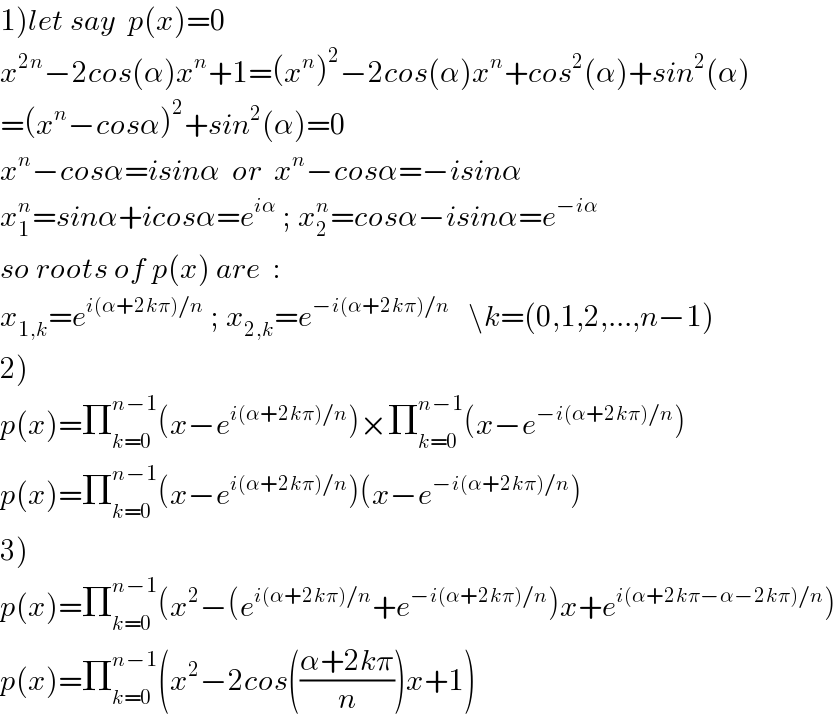
Question Number 30592 by abdo imad last updated on 23/Feb/18
![let p(x)=x^(2n) −2cosα x^n +1 1) find roots lf p(x) 2)factorize p(x) inside C[x] 3)factorize p(x) inside R[x].](Q30592.png)
$${let}\:{p}\left({x}\right)={x}^{\mathrm{2}{n}} \:−\mathrm{2}{cos}\alpha\:{x}^{{n}} \:+\mathrm{1} \\ $$$$\left.\mathrm{1}\right)\:{find}\:{roots}\:{lf}\:{p}\left({x}\right) \\ $$$$\left.\mathrm{2}\right){factorize}\:{p}\left({x}\right)\:{inside}\:{C}\left[{x}\right] \\ $$$$\left.\mathrm{3}\right){factorize}\:{p}\left({x}\right)\:{inside}\:{R}\left[{x}\right]. \\ $$
Answered by sma3l2996 last updated on 23/Feb/18

$$\left.\mathrm{1}\right){let}\:{say}\:\:{p}\left({x}\right)=\mathrm{0} \\ $$$${x}^{\mathrm{2}{n}} −\mathrm{2}{cos}\left(\alpha\right){x}^{{n}} +\mathrm{1}=\left({x}^{{n}} \right)^{\mathrm{2}} −\mathrm{2}{cos}\left(\alpha\right){x}^{{n}} +{cos}^{\mathrm{2}} \left(\alpha\right)+{sin}^{\mathrm{2}} \left(\alpha\right) \\ $$$$=\left({x}^{{n}} −{cos}\alpha\right)^{\mathrm{2}} +{sin}^{\mathrm{2}} \left(\alpha\right)=\mathrm{0} \\ $$$${x}^{{n}} −{cos}\alpha={isin}\alpha\:\:{or}\:\:{x}^{{n}} −{cos}\alpha=−{isin}\alpha \\ $$$${x}_{\mathrm{1}} ^{{n}} ={sin}\alpha+{icos}\alpha={e}^{{i}\alpha} \:;\:{x}_{\mathrm{2}} ^{{n}} ={cos}\alpha−{isin}\alpha={e}^{−{i}\alpha} \\ $$$${so}\:{roots}\:{of}\:{p}\left({x}\right)\:{are}\:\:: \\ $$$${x}_{\mathrm{1},{k}} ={e}^{{i}\left(\alpha+\mathrm{2}{k}\pi\right)/{n}} \:;\:{x}_{\mathrm{2},{k}} ={e}^{−{i}\left(\alpha+\mathrm{2}{k}\pi\right)/{n}} \:\:\:\backslash{k}=\left(\mathrm{0},\mathrm{1},\mathrm{2},...,{n}−\mathrm{1}\right) \\ $$$$\left.\mathrm{2}\right) \\ $$$${p}\left({x}\right)=\prod_{{k}=\mathrm{0}} ^{{n}−\mathrm{1}} \left({x}−{e}^{{i}\left(\alpha+\mathrm{2}{k}\pi\right)/{n}} \right)×\prod_{{k}=\mathrm{0}} ^{{n}−\mathrm{1}} \left({x}−{e}^{−{i}\left(\alpha+\mathrm{2}{k}\pi\right)/{n}} \right) \\ $$$${p}\left({x}\right)=\prod_{{k}=\mathrm{0}} ^{{n}−\mathrm{1}} \left({x}−{e}^{{i}\left(\alpha+\mathrm{2}{k}\pi\right)/{n}} \right)\left({x}−{e}^{−{i}\left(\alpha+\mathrm{2}{k}\pi\right)/{n}} \right) \\ $$$$\left.\mathrm{3}\right) \\ $$$${p}\left({x}\right)=\prod_{{k}=\mathrm{0}} ^{{n}−\mathrm{1}} \left({x}^{\mathrm{2}} −\left({e}^{{i}\left(\alpha+\mathrm{2}{k}\pi\right)/{n}} +{e}^{−{i}\left(\alpha+\mathrm{2}{k}\pi\right)/{n}} \right){x}+{e}^{{i}\left(\alpha+\mathrm{2}{k}\pi−\alpha−\mathrm{2}{k}\pi\right)/{n}} \right) \\ $$$${p}\left({x}\right)=\prod_{{k}=\mathrm{0}} ^{{n}−\mathrm{1}} \left({x}^{\mathrm{2}} −\mathrm{2}{cos}\left(\frac{\alpha+\mathrm{2}{k}\pi}{{n}}\right){x}+\mathrm{1}\right) \\ $$
